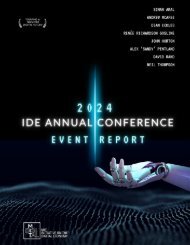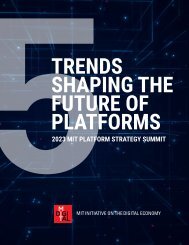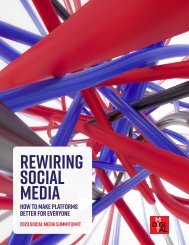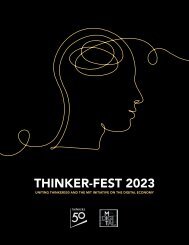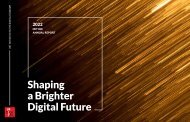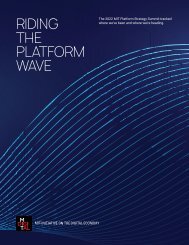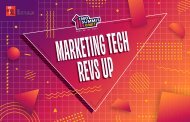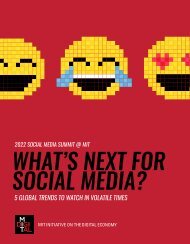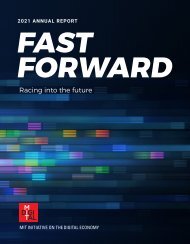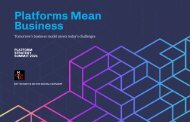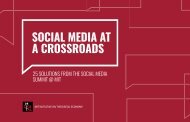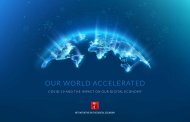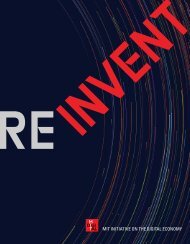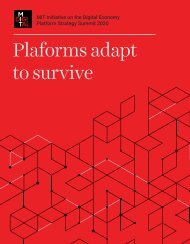2023 MIT IDE Annual Report
Create successful ePaper yourself
Turn your PDF publications into a flip-book with our unique Google optimized e-Paper software.
AI RISING
LETTER FROM THE DIRECTOR<br />
ALL IN ON AI<br />
In <strong>2023</strong>, our research team doubled down on efforts to analyze,<br />
test, forecast and discuss AI advancements and challenges<br />
We continue<br />
to stay both<br />
vigilant and<br />
cutting-edge.<br />
SINAN ARAL<br />
DIRECTOR, <strong>MIT</strong> <strong>IDE</strong><br />
In the eight years since the <strong>MIT</strong> Initiative on the Digital<br />
Economy began its research efforts, digital technologies have<br />
transformed society, business and the economy, creating the<br />
internet-everything world we know today. There also were more<br />
than a few flameouts and slow burns. But AI is firmly in the<br />
transformative category; it appears to be here to stay.<br />
Led by the meteoric rise of large language models (LLMs) and<br />
ChatGPT, AI is taking on mainstream businesses and society<br />
as a whole. Accenture’s AI Services’ group notes that 97% of<br />
executives surveyed in June <strong>2023</strong> said generative AI will be<br />
“transformative to their company and industry.” Fully 95% of<br />
organizations are increasing their AI investments.<br />
In today’s smart world, voice, touch and sensors of all kinds<br />
understand us and anticipate our thoughts and actions. The<br />
potential is vast.<br />
While <strong>2023</strong> was pivotal for the rise of AI, various iterations of<br />
the technology have been in development for decades. Along<br />
the way, there have been many hyped-up expectations and false<br />
starts—but also many notable successes. The <strong>IDE</strong> predicted<br />
a machine-learning boom at our 2018 <strong>Annual</strong> Conference,<br />
delivering a presentation about sports stories written by an AI<br />
assistant. We continue to stay both vigilant and cutting-edge.<br />
Our research team has doubled down on efforts to analyze, test,<br />
forecast and discuss AI advancements, as well as the risks that<br />
an AI-centric world may offer.<br />
Renée Richardson Gosline’s work on including humans in<br />
the loop and creating friction to make optimized decisions<br />
is a great example of our research efforts. Similarly, John<br />
Horton’s two research studies—one on algorithmic writing<br />
assistance for job seekers and the other on using LLMs<br />
as simulated economic agents—are both fascinating. Neil<br />
Thompson is breaking new ground with his analysis of AI<br />
scaling scenarios. David Rand is part of an <strong>MIT</strong> committee<br />
offering policy recommendations on AI governance. As these<br />
efforts indicate, we’re committed to the rigorous study of both<br />
the promises and perils that AI may bring.<br />
At the same time, we’re keeping a watchful eye on the critical<br />
issues of misinformation, digital experimentation, distributed<br />
technologies and platform marketplaces. This is reflected in our<br />
prominent research publications, events and education. Rand’s<br />
work on misinformation is prolific. Dean Eckles’ development of<br />
new data-analytics mechanisms is broadening the scope of uses.<br />
The work of Thompson, Jonathan Ruane and Andrew McAfee on<br />
quantum computing is eye-opening. And Alex “Sandy” Pentland<br />
continues to illuminate new paths into our digital future.<br />
There’s a lot more underway for 2024, thanks to the support of<br />
our stakeholders—generous donors, foundations, and corporate<br />
supporters. It’s been refreshing to see you in person again, and<br />
we look forward to leaping with you into the AI future.<br />
Thank you for keeping the <strong>IDE</strong>’s critical work front and center.<br />
SINAN ARAL<br />
DIRECTOR<br />
INS<strong>IDE</strong><br />
4 <strong>2023</strong> HIGHLIGHTS<br />
6 ANALYZING: RESEARCH<br />
9 ACHIEVING: RECOGNITION & AWARDS<br />
10 CONVENING: EVENTS<br />
13 EDUCATING<br />
14 LEADING<br />
16 LETTER FROM THE EXECUTIVE<br />
DIRECTOR<br />
<strong>MIT</strong> <strong>IDE</strong> ANNUAL REPORT <strong>2023</strong> | 3
GEEKING OUT<br />
In November, <strong>IDE</strong><br />
co-director Andrew<br />
McAfee launched his<br />
new book, The Geek<br />
Way, to much acclaim.<br />
Andy was featured on<br />
numerous podcasts,<br />
where he spoke about<br />
eschewing bureaucracy<br />
and cultural sclerosis for<br />
what he calls “the geek<br />
way” in business.<br />
INAUGURAL THINKER-FEST EVENT<br />
In many ways, <strong>2023</strong> was outstanding for the <strong>IDE</strong>.<br />
We kicked off the year with the first <strong>MIT</strong> Thinker-<br />
Fest event, melding the academic resources of<br />
the <strong>IDE</strong> with the brainpower of the Thinkers50<br />
community. This event attracted more than 800<br />
virtual attendees worldwide.<br />
At this year’s Platform Strategy Summit, Lindsey Gamble<br />
(center) of Mavrck shared his perspective about the huge<br />
growth of the creator community. Ansley Williams (left)<br />
of Ogilvy was also on the panel, which was moderated by<br />
event co-chair Peter C. Evans (right).<br />
<strong>2023</strong> IN REVIEW<br />
A YEAR OF CONVENING,<br />
COLLABORATING,<br />
EDUCATING AND LEADING<br />
We brought together global experts from academia, industry,<br />
government and nonprofits to share diverse opinions and experiences<br />
A STRONGER COLLABORATION<br />
In <strong>2023</strong>, we solidified our collaboration with founding<br />
member Accenture by co-authoring papers on cloud<br />
computing, quantum computing and responsible AI.<br />
In addition, Accenture leaders participated in <strong>IDE</strong> events<br />
and forums throughout the year.<br />
MEDIUM GROWS LARGER<br />
The <strong>IDE</strong>’s research projects and events continue to garner<br />
global attention from the press and media, advancing<br />
the public’s understanding of the digital economy. Our<br />
channels experienced widespread growth as we promoted<br />
content across LinkedIn, Medium, X, Instagram and our<br />
website and video channels.<br />
Our audience has grown to more than 9,000 followers<br />
on Medium—double the number from a year ago—and<br />
engagement is up. Among our most-viewed blogs of<br />
<strong>2023</strong> were posts on social media platforms of the future<br />
and ChatGPT.<br />
BACK IN THE FLESH<br />
After a few years of virtual-only events, we were<br />
happy to meet attendees both in person and virtually<br />
this year with excellent response and participation.<br />
The Social Media Summit engaged 17,000 virtual<br />
attendees while the Platform Strategy Summit<br />
attracted nearly 200 participants. Overall, we<br />
boosted our engagement with audiences while also<br />
welcoming new members and partners.<br />
IN THE MEDIA<br />
Director Sinan Aral was a sought-after commentator<br />
on national and global media, including MSNBC and<br />
Yahoo!Finance, where he called President Biden’s<br />
AI Executive Order “big, bold and broad.” Other<br />
<strong>IDE</strong> group leaders led timely conversations about<br />
their work, too. That included Neil Thompson in an<br />
interview with Politico, David Rand with Thinkers50,<br />
and Alex “Sandy” Pentland speaking at the Boston<br />
Global Forum.<br />
A-LAB KEEPS WINNING<br />
The <strong>IDE</strong>’s flagship educational offering—the Analytics<br />
Lab (A-Lab)—continues to attract both students and<br />
project hosts. The year’s class included 93 graduate<br />
students and 22 projects hosted by 18 companies.<br />
The winning team represented Akkodis.<br />
<strong>MIT</strong> <strong>IDE</strong> ANNUAL REPORT <strong>2023</strong> | 4 <strong>MIT</strong> <strong>IDE</strong> ANNUAL REPORT <strong>2023</strong> | 5
ANALYZING<br />
RESEARCH BUILDS A<br />
STRONG FOUNDATION<br />
The insights and studies produced by <strong>IDE</strong> research groups<br />
frame critical and timely topics facing the digital economy<br />
With AI taking center stage in <strong>2023</strong>, concerns<br />
about GPT misuse, regulation and competition<br />
were debated globally. These topics also<br />
informed our research agenda. The more<br />
technology’s role in society was top-of-mind<br />
and hotly debated, the more valuable the <strong>IDE</strong>’s<br />
work became. Our leaders are primary sources<br />
for data, research, analysis and insights on the<br />
state of AI, including its impact on society.<br />
We continue our<br />
rigorous focus<br />
across eight<br />
research groups.<br />
VIEW OUR LATEST RESEARCH PROJECTS AT <strong>IDE</strong>.<strong>MIT</strong>.EDU<br />
HUMAN-FIRST AI<br />
RENÉE RICHARDSON<br />
GOSLINE<br />
Renée Richardson Gosline leads this research group<br />
which examines human-AI interaction through the lens<br />
of behavioral science. The group’s research focuses on<br />
the symbiosis between humans and AI, as well as the<br />
competitive advantages possible by creating this synergy<br />
in the right context. This includes human-AI interactions to<br />
shape systems that place humans first, encouraging optimal<br />
decision making, and prioritizing responsible innovation.<br />
The group’s research topics also include human trust of AI<br />
algorithms, algorithmic bias, and mutual learning between<br />
humans and algorithms. Using experiments and mixedmethod<br />
approaches, the group also proffers strategic,<br />
policy and behavioral solutions.<br />
As organizations experience rapid digital transformation,<br />
the effective adoption of AI by employees, partners and<br />
customers becomes essential to achieving a competitive<br />
advantage. Society must also place the welfare of humans<br />
first, to maximize the benefits of human-AI collaboration<br />
and reduce harm.<br />
ANDREW<br />
McAFEE<br />
TECHNOLOGY-DRIVEN ORGANIZATIONS<br />
AND DIGITAL CULTURE<br />
This research group, previously focusing on Tech for Good,<br />
is expanding to include the culture and impact of tech-driven<br />
organizations. How can technology continue to drive positive<br />
progress in our world? As organizations embrace AI, what<br />
other changes must take place?<br />
Technology is the most disruptive force in human history,<br />
ushering in unprecedented health, convenience and<br />
prosperity. At the same time, innovation is accompanied<br />
by the potential for peril. Leadership must evolve and<br />
constantly reframe the conversation. That means asking not<br />
only, “What will technology do to our economy, society and<br />
environment?” but also, “What will we do with technology?”<br />
This research group amplifies the <strong>IDE</strong>’s ongoing position<br />
that faster, more inclusive technology progress and access—<br />
not a slowdown—is needed to meet both current and future<br />
needs. The group is led by Andrew McAfee, whose new book,<br />
The Geek Way, points to an emerging body of research.<br />
DEAN<br />
ECKLES<br />
DAVID<br />
RAND<br />
ALEX “SANDY”<br />
PENTLAND<br />
JOHN<br />
HORTON<br />
NEW DATA ANALYTICS<br />
How do AI algorithms affect purchasing behavior? How<br />
do you assess the efficacy of short-term interventions<br />
that aim for a long-term outcome, like reducing customer<br />
churn? What happens to an individual and community’s<br />
economic outcomes when those individuals move to a<br />
new state or country?<br />
These and other questions are being examined by the<br />
New Data Analytics research group’s experimental and<br />
observational studies. Headed by Dean Eckles, the group<br />
employs applied statistics, experimental design, machine<br />
learning and causal inference to understand how new<br />
technologies and means of social interaction impact<br />
productivity, consumer demand, political mobilization<br />
and public health. This includes impacts on consumer<br />
demand, information sharing, worker productivity and<br />
even stock prices.<br />
MISINFORMATION & FAKE NEWS<br />
Why do people share inaccurate content online? What<br />
can be done to reduce the spread of misinformation and<br />
fake news? These topics continue to perplex researchers<br />
seeking better solutions—whether in healthcare, politics,<br />
news or social media.<br />
Cognitive science research and digital field experiments<br />
are the tools this research group, led by David Rand, uses<br />
to advance the fight against online misinformation. The<br />
group sheds light on how people decide what to believe<br />
and share. Then it leverages these insights to design antimisinformation<br />
interventions that include labeling, accuracy<br />
prompts, source identification and the wisdom of crowds.<br />
This research group runs experiments to test the impact<br />
of these interventions, and it collaborates with technology<br />
companies including Google and Meta to translate science<br />
into real-world actions. The group was influential in <strong>2023</strong>,<br />
with more than a dozen peer-reviewed research journals.<br />
BUILDING A DISTRIBUTED ECONOMY<br />
This research group, led by Alex “Sandy” Pentland,<br />
studies how finance, manufacturing, data and human<br />
resources are managed in a distributed world.<br />
The traditional roles of corporations and employees<br />
are being transformed in ways that include decentralized<br />
autonomous organizations, or DAOs. The group’s research<br />
focuses on how organizations can coordinate employees<br />
and companies to optimize both efficiency and robustness<br />
in this fast-changing environment.<br />
This group also examines software and legal infrastructure<br />
for supporting distributed organizations; and the practical<br />
protocols that allow the audit of supply chains for carbon<br />
tracking, fraud detection and legal compliance. In 2024,<br />
the group will study how well these methods work in real<br />
environments to inform, guide and shape critical decisions<br />
by industry, government and society.<br />
AI, MARKETPLACES AND LABOR<br />
ECONOMICS<br />
This research group led by John Horton explores the<br />
prevalence and importance of online marketplaces and<br />
computer-mediated transactions. The group also asks:<br />
How can these marketplaces be designed to create<br />
widespread benefits for all?<br />
The research aims to understand the rise and growth of<br />
online marketplaces. It also seeks to guide incumbent<br />
and startup companies toward successful platform<br />
strategies and best practices. Given that many of these<br />
platforms are focused on shared labor, there are many<br />
compelling questions about practice, benefits, strategy<br />
and public policy.<br />
The accelerant of AI raises further questions about how<br />
job seekers can optimize new aids such as ChatGPT.<br />
<strong>MIT</strong> <strong>IDE</strong> ANNUAL REPORT <strong>2023</strong> | 6 <strong>MIT</strong> <strong>IDE</strong> ANNUAL REPORT <strong>2023</strong> | 7
RESEARCH BUILDS A STRONG FOUNDATION CONTINUED<br />
SINAN<br />
ARAL<br />
NEIL<br />
THOMPSON<br />
ACHIEVING<br />
RECOGNITION & AWARDS<br />
<strong>IDE</strong> research and researchers have been lauded within<br />
and outside of the <strong>MIT</strong> community<br />
GENERATIVE AI & DECENTRALIZATION<br />
This research group is dedicated to understanding how<br />
generative, decentralizing technologies such as GenAI<br />
and blockchain affect power, scalability, productivity<br />
and the promise of an inclusive and prosperous digital<br />
future. The group has expanded its previous focus on<br />
Web3 architectures to now include the latest technology<br />
shifts. This newly refocused research group is led by <strong>IDE</strong><br />
Director Sinan Aral.<br />
One of the group’s large-scale projects seeks to precisely<br />
measure the productivity improvements offered by GenAI<br />
to knowledge workers.<br />
When we are thinking<br />
about ‘should AI do a<br />
task?’ it’s not really a<br />
question of ‘could an AI<br />
do a task?’ It’s whether<br />
the process of combining<br />
AI with human capabilities<br />
is worth the effort.<br />
JOHN HORTON<br />
AI, MARKETPLACES AND LABOR<br />
ECONOMICS RESEARCH LEAD<br />
<strong>MIT</strong> <strong>IDE</strong><br />
ARTIFICIAL INTELLIGENCE, QUANTUM<br />
AND BEYOND<br />
IT innovations have transformed our lives and created<br />
enormous prosperity for society. But how are these<br />
technologies changing and how fast will we need<br />
to adapt?<br />
This research group, led by Neil Thompson, explores<br />
the biggest trends that shape IT, from Moore’s Law<br />
to the emergence of AI Scaling Laws. The team of<br />
computer scientists, engineers and economists uses<br />
an interdisciplinary lens to view computing progress<br />
and identify the most important trends, impacts<br />
and opportunities. By exploring key computing<br />
technologies—including AI, specialized chips, quantum<br />
computers and algorithms—the team also generates<br />
insights that business leaders can use to promote and<br />
sustain greater prosperity.<br />
We also ask how important new technologies, such<br />
as quantum computing, will be. We focus on two<br />
lenses for our work: What are the fundamental drivers<br />
of technology change? What will these mean for the<br />
evolution of firms and the prosperity of society?<br />
KEY INSIGHTS<br />
3 TOP AI<br />
CONCERNS<br />
Panelists at <strong>MIT</strong>’s <strong>2023</strong><br />
Conference on Digital<br />
Experimentation (CoDE)<br />
raised several key challenges<br />
resulting from the rapid<br />
development of GenAI tools.<br />
Chief among these concerns<br />
were biased reasoning, a<br />
lack of data transparency<br />
in training data and<br />
worries about human job<br />
displacement.<br />
BIASED REASONING<br />
LACK OF TRAINING<br />
DATA TRANSPARENCY<br />
HUMAN LABOR<br />
REPLACEMENT<br />
Left: Thinkers50 Co-founder Des Dearlove (left) with <strong>IDE</strong><br />
Director Sinan Aral at the Thinker-Fest event.<br />
Right: <strong>IDE</strong> researchers Geoffrey Parker and Marshall Van<br />
Alstyne at the Thinkers50 awards in London.<br />
THINKERS50 AWARDS<br />
David Rand, an <strong>MIT</strong> Sloan professor and <strong>IDE</strong> research group leader,<br />
was nominated for the Thinkers50 Digital Thinking Award, which<br />
honors researchers who shed light on the digital reality of business.<br />
At the gala awards in London, Director Sinan Aral, along with <strong>IDE</strong><br />
Researcher Geoffrey Parker, Fellow Marshall Van Alstyne and co-<br />
Director Andrew McAfee, were also honored for topping the <strong>2023</strong><br />
Thinkers50 list.<br />
<strong>IDE</strong> DEEPENS COLLABORATION<br />
WITH ACCENTURE<br />
Accenture, a founding member of the <strong>IDE</strong>, has embarked on an<br />
extensive program of research and activities with <strong>IDE</strong> faculty,<br />
scientists and staff for nearly a decade. In <strong>2023</strong> this partnership<br />
focused on quantum computing (with Neil Thompson, Andrew<br />
McAfee and Jonathan Ruane); cloud computing (with Wang Jin<br />
and Sebastian Steffen); and responsible AI (with Renée<br />
Richardson Gosline).<br />
Looking ahead to 2024, Accenture and the <strong>IDE</strong> will continue their<br />
focus on quantum computing and responsible AI; we’ll also add<br />
a deeper exploration of GenAI and productivity improvements in<br />
knowledge work (with Sinan Aral).<br />
<strong>MIT</strong> POLICY COM<strong>MIT</strong>TEE<br />
In December, David Rand was also named to an <strong>MIT</strong><br />
policy committee that issued a series of briefs in a<br />
white paper about AI governance. The framework<br />
describes advances in auditing of new AI tools and calls<br />
for government approved, self-regulatory organizations,<br />
among other recommendations. Rand’s research work<br />
on AI content labels was also included.<br />
BEST PAPER<br />
Sukwoong Choi, an <strong>IDE</strong> postdoctoral associate,<br />
co-authored a study nominated for best paper at<br />
the International Conference on Computer and<br />
Information Science and Technology (CIST <strong>2023</strong>), held<br />
in October in Phoenix, Ariz. Choi co-wrote the paper,<br />
Standing on the Shoulders of AI: Pushing the Knowledge<br />
Frontier by Learning from AI, with Hyo Kang, Namil Kim,<br />
and Junsik Kim.<br />
HORTON GETS TENURE<br />
John Horton was granted tenure at <strong>MIT</strong> Sloan in<br />
May. Horton leads the <strong>IDE</strong>’s AI, Labor Economics &<br />
Online Marketplaces Research Group, and serves as<br />
the Richard S. Leghorn (1939) Career Development<br />
Professor and associate professor of information<br />
technologies at <strong>MIT</strong> Sloan. His research focuses on<br />
the intersection of labor economics, market design<br />
and information systems.<br />
<strong>MIT</strong> <strong>IDE</strong> ANNUAL REPORT <strong>2023</strong> | 8 <strong>MIT</strong> <strong>IDE</strong> ANNUAL REPORT <strong>2023</strong> | 9
<strong>MIT</strong> PLATFORM STRATEGY SUM<strong>MIT</strong><br />
Nearly 200 in-person and virtual attendees heard a wide range of fresh<br />
perspectives at the <strong>MIT</strong> Platform Strategy Summit in July. Throughout the<br />
day, Summit co-leaders Geoffrey Parker, Peter Evans and Marshall Van<br />
Alstyne hosted AI industry executives, academics and regulatory experts.<br />
The consensus: Challenges and opportunities abound even as these<br />
powerful ecosystems consolidate and mature.<br />
SOCIAL MEDIA SUM<strong>MIT</strong> @ <strong>MIT</strong><br />
Nearly 17,000 virtual attendees joined the third annual Social Media Summit<br />
@<strong>MIT</strong> on May 23. The event featured a range of perspectives on reining in the<br />
rampant influence of digital life. <strong>IDE</strong> Director Sinan Aral and other speakers<br />
challenged users and platforms to revive the benefits of open public forums<br />
and tamp down the misinformation, bias and infractions. The event’s keynote<br />
was delivered by Christopher Graves, president of Ogilvy’s Behavioral Center,<br />
who outlined both the promises and risks of personality-based marketing.<br />
CONVENING<br />
GREAT<br />
MINDS<br />
JOIN<br />
TOGETHER<br />
Events continue to be the <strong>IDE</strong>’s<br />
primary means for amplifying our<br />
research insights far and wide<br />
In October, <strong>IDE</strong> Research Lead Neil Thompson<br />
(fifth from left, front row) hosted a workshop<br />
on AI scaling with industry practitioners.<br />
Going back more than 10 years,<br />
there are a number of ways<br />
businesses can benefit from<br />
human-machine collaboration.<br />
As this new era of generative AI<br />
comes into the workplace, I don’t<br />
see those benefits going away.<br />
H. JAMES WILSON<br />
GLOBAL MANAGING DIRECTOR,<br />
IT AND BUSINESS RESEARCH<br />
ACCENTURE<br />
SPEAKING AT THE <strong>2023</strong> <strong>MIT</strong><br />
PLATFORM STRATEGY SUM<strong>MIT</strong><br />
<strong>IDE</strong> SEMINAR SERIES<br />
THINKER-FEST<br />
The inaugural <strong>MIT</strong> Thinker-Fest event melded the academic resources of the <strong>IDE</strong><br />
with the brainpower of the Thinkers50 community. Sinan Aral hosted the virtual<br />
event on February 23 with more than 800 virtual attendees joining from around the<br />
globe. During the session, <strong>IDE</strong> leaders Renée Richardson Gosline and John Horton,<br />
along with scholars Geoffrey Parker and Marshall Van Alstyne, debated whether<br />
the splintered internet can be repaired, the state of remote work, and how to control<br />
AI bias. Other featured speakers included digital anthropologist Rahaf Harfoush,<br />
company founder Martin Lindstrom, and Dell VP of Engineering Jerry Carter.<br />
<strong>MIT</strong> PhD Candidate<br />
Zanele Munyikwa<br />
presented research<br />
on Generative AI at<br />
her seminar talk.<br />
Our informal seminars highlighted early results from<br />
current research projects and provocative ideas from<br />
<strong>MIT</strong> scholars and other researchers.<br />
SPRING <strong>2023</strong><br />
Raghav Narsalay<br />
Accenture<br />
John Micheal Van Reenen<br />
London School of Economics<br />
<strong>MIT</strong> <strong>IDE</strong><br />
Michael Luca<br />
Harvard Business School<br />
Bo Cowgill<br />
Columbia University<br />
Glen Weyl<br />
Microsoft<br />
Alex Moehring<br />
<strong>MIT</strong><br />
FALL <strong>2023</strong><br />
Chenhao Tan<br />
University of Chicago<br />
Georgios Petropolous<br />
<strong>MIT</strong><br />
Park Sinchaisri<br />
University of California,<br />
Berkeley<br />
Dokyun “DK” Lee<br />
Boston University<br />
Zanele Munyika<br />
<strong>MIT</strong><br />
<strong>MIT</strong> <strong>IDE</strong> ANNUAL REPORT <strong>2023</strong> | 10 <strong>MIT</strong> <strong>IDE</strong> ANNUAL REPORT <strong>2023</strong> | 11
EDUCATING<br />
LEADERS TEACH TOOLS<br />
TO NAVIGATE NEW TECH<br />
Business leaders can become students; students can collaborate<br />
with industry<br />
CONFERENCE ON DIGITAL EXPERIMENTATION (CoDE)<br />
How can experts design better AI? This and other technical questions were explored<br />
at the <strong>2023</strong> <strong>MIT</strong> Conference on Digital Experimentation (CoDE), held at <strong>MIT</strong> on<br />
November 10–11. The 10th annual event offered a mecca for those testing and<br />
proving the latest theories underlying emerging technologies. More than 300 in-person<br />
attendees heard presentations from 17 plenary speakers and 116 parallel sessions<br />
and poster presenters. The presentations, ranging from the general to the highly<br />
specialized, shared common focus areas: digital experimentation, the impact<br />
of advanced technology, and the benefits of collaboration and shared learning.<br />
<strong>MIT</strong> FUTURETECH WORKSHOP ON AI<br />
SCALING AND ITS IMPLICATIONS<br />
Vital questions about AI’s limits and challenges were<br />
explored at the <strong>2023</strong> <strong>MIT</strong> FutureTech Workshop on AI<br />
Scaling and Its Implications, held October 12–13 at<br />
the <strong>MIT</strong> Museum. This invitation-only event gathered<br />
over 70 prominent computer scientists, engineers and<br />
economists to discuss AI development, automation<br />
and more. Among the questions explored: Can AI<br />
continue to progress at the same rapid pace we’ve<br />
seen in the last few years? And if so, should it?<br />
Neil Thompson, Director of <strong>MIT</strong> FutureTech and an<br />
<strong>MIT</strong> <strong>IDE</strong> research lead, led a discussion on research<br />
prioritization with the aim of shaping new research<br />
project agendas.<br />
Other speakers at the workshop included Pamela<br />
Fine Mishkin of Open AI; Eric Drexler of the<br />
University of Oxford; Dan Hendrycks of the Centre<br />
for AI Safety; and Jacob Steinhardt of the University<br />
of California, Berkeley.<br />
<strong>IDE</strong> ANNUAL CONFERENCE<br />
The <strong>2023</strong> <strong>IDE</strong> <strong>Annual</strong> Conference, a live and virtual<br />
event exclusively for <strong>IDE</strong> stakeholders, was held in May.<br />
This annual drink-from-the-firehose event included<br />
summaries from each of our eight research group leads<br />
and brief presentations of research either underway<br />
or recently completed. The keynote was provided by<br />
Yamini Ragan, CEO of Hubspot, who shared highlights<br />
of her professional journey.<br />
iQuHACK<br />
Panels at CoDE were led by <strong>IDE</strong><br />
lead Dean Eckles (top left) and<br />
<strong>IDE</strong> fellow David Holtz, (bottom<br />
left) and included experts from<br />
Meta, Google, IBM and academia.<br />
The opening panel of the fourth annual Interdisciplinary<br />
Quantum Hackathon, or iQuHACK, was held on January<br />
27. Co-sponsored by the <strong>IDE</strong>, the event featured <strong>IDE</strong><br />
Research Scientist Jonathan Ruane, who discussed the<br />
potential market opportunities for quantum computing.<br />
The event drew more than 300 in-person attendees at<br />
<strong>MIT</strong>, plus several thousand developers online—all of<br />
whom could test their code on both real and simulated<br />
quantum hardware.<br />
Education forms the backbone of all that’s<br />
done at <strong>MIT</strong> Sloan. Here at the <strong>IDE</strong>, we<br />
take great pride in sharing our insights<br />
and understandings among students,<br />
stakeholders and the broader community.<br />
Action Learing and Executive Education are<br />
perfect vehicles for this interaction.<br />
<strong>MIT</strong> ANALYTICS LAB (A-LAB)<br />
The <strong>MIT</strong> Analytics Lab empowers <strong>IDE</strong> stakeholders to<br />
submit projects and data to teams of <strong>MIT</strong> graduate<br />
students. These teams then use analytics, machine<br />
learning and other methods of analysis to develop<br />
results that will diagnose, enable or uncover solutions<br />
to real business issues and opportunities.<br />
In December, the <strong>IDE</strong> hosted the <strong>2023</strong> <strong>MIT</strong> Analytics<br />
Lab (A-Lab) final presentations with 22 student projects<br />
representing 21 companies. A panel of judges—Renée<br />
Richardson Gosline of <strong>MIT</strong> Sloan/<strong>MIT</strong> <strong>IDE</strong>; Jennifer<br />
Jordan of iGlobe Partners; and Tod Loofbourrow of<br />
ViralGains—had the difficult task of naming just one<br />
winner. Ultimately, the trophy went to Team MGSJ,<br />
mentored by Ravi Doddavaram. The winning team,<br />
representing Akkodis, included Srikaran Boya, Giorgio<br />
Demarchi, Jan Girgott and Matea Gjika.<br />
EXECUTIVE EDUCATION<br />
In <strong>2023</strong>, <strong>IDE</strong> faculty and researchers continued to launch and<br />
support a full course load of best-in-class continuing education<br />
for professionals through <strong>MIT</strong> Sloan Executive Education.<br />
A SAMPLING OF <strong>2023</strong> EXECUTIVE<br />
EDUCATION COURSES<br />
Breakthrough Customer<br />
Experience (CX) Strategy<br />
Leading the AI-Driven<br />
Organization<br />
Making AI Work: Machine<br />
Intelligence for<br />
Business Strategy<br />
Systematic Innovation<br />
of Products, Processes<br />
and Services<br />
Digital Marketing<br />
Analytics<br />
The <strong>MIT</strong> student team<br />
working with Akkodis<br />
was named the winning<br />
A-Lab project in <strong>2023</strong>.<br />
Social Media Strategy:<br />
Creating Engagement,<br />
Insight and Action<br />
Machine Learning in<br />
Business<br />
AI Implications for<br />
Business Strategy<br />
Leading the Future of<br />
Work<br />
Digital Business<br />
Strategy: Harnessing Our<br />
Digital Future<br />
VIEW MORE EXEC ED COURSES AT EXEC.<strong>MIT</strong>.EDU<br />
<strong>MIT</strong> <strong>IDE</strong> ANNUAL REPORT <strong>2023</strong> | 12 <strong>MIT</strong> <strong>IDE</strong> ANNUAL REPORT <strong>2023</strong> | 13
LEADING THE WAY<br />
The <strong>IDE</strong> is fueled by a wide range of<br />
scholars, staff and supporters<br />
THANKS TO OUR<br />
LOYAL SUPPORTERS<br />
<strong>IDE</strong> DIRECTORS<br />
RESEARCH GROUP LEADS<br />
Sinan Aral<br />
Professor, <strong>MIT</strong> Sloan School of<br />
Management<br />
Dean Eckles<br />
Associate Professor, <strong>MIT</strong> Sloan<br />
School of Management<br />
Renée Richardson Gosline<br />
Senior Lecturer, <strong>MIT</strong> Sloan School of<br />
Management<br />
John Horton<br />
Associate Professor, <strong>MIT</strong> Sloan<br />
School of Management<br />
Andrew McAfee<br />
Co-Director & Principal Research<br />
Scientist, <strong>MIT</strong> <strong>IDE</strong><br />
Alex “Sandy” Pentland<br />
Professor, <strong>MIT</strong> Media Lab<br />
David Rand<br />
Professor, <strong>MIT</strong> Sloan School of<br />
Management<br />
Neil Thompson<br />
Research Scientist, <strong>MIT</strong> Sloan School<br />
of Management and CSAIL<br />
RESEARCHERS<br />
Daron Acemoglu<br />
Institute Professor, <strong>MIT</strong> Economics<br />
Department<br />
Jayson Lynch<br />
Research Scientist, <strong>MIT</strong> CSAIL<br />
Kristina McElheran<br />
Assistant Professor, Rotman School<br />
of Management, University of<br />
Toronto<br />
Geoffrey Parker<br />
Professor of Engineering Innovation,<br />
Dartmouth College<br />
Georgios Petropoulos<br />
Research Associate, <strong>MIT</strong> <strong>IDE</strong><br />
Jonathan Ruane<br />
Research Scientist, <strong>MIT</strong> <strong>IDE</strong><br />
Sinan Aral<br />
Director, <strong>MIT</strong> <strong>IDE</strong>; Professor,<br />
<strong>MIT</strong> Sloan School of Management<br />
DIGITAL FELLOWS &<br />
RESEARCH AFFILIATES<br />
Elizabeth Altman<br />
Associate Professor, Manning<br />
School of Business, University of<br />
Massachusetts, Lowell<br />
Matt Beane<br />
Assistant Professor, Technology<br />
Management Program, University of<br />
California, Santa Barbara<br />
Seth Benzell<br />
Assistant Professor, Argyros<br />
School of Business and Economics,<br />
Chapman University<br />
Sukwoong Choi<br />
Assistant Professor, Information<br />
Systems and Business Analytics,<br />
Massry School of Business,<br />
University at Albany, SUNY<br />
Thomas Davenport<br />
Professor, Babson College<br />
Paramveer Dhillon<br />
Assistant Professor of Information,<br />
School of Information, University of<br />
Michigan<br />
Apostolos Filippas<br />
Assistant Professor, Gabelli School<br />
of Business, Fordham University<br />
Andrey Fradkin<br />
Assistant Professor of Marketing,<br />
Questrom School of Business,<br />
Boston University<br />
Joshua Gans<br />
Professor, Rotman School of<br />
Management & Department of<br />
Economics, University of Toronto<br />
Kiran Garimella<br />
Assistant Professor of Library and<br />
Information Science, School of<br />
Communication and Information,<br />
Rutgers University<br />
David Holtz<br />
Assistant Professor, Haas School<br />
of Business, University of California,<br />
Berkeley<br />
Andrew McAfee<br />
Co-Director & Principal Research<br />
Scientist, <strong>MIT</strong> <strong>IDE</strong><br />
John Irons<br />
Senior VP and Head of Research,<br />
Siegel Family Endowment<br />
Eaman Jahani<br />
Assistant Professor, Robert H. Smith<br />
School of Business, University of<br />
Maryland<br />
Wang Jin,<br />
Research Scientist, Stanford Digital<br />
Economy Lab<br />
Hyo Kang<br />
Assistant Professor, Marshall School<br />
of Business, University of Southern<br />
California<br />
Paul Kedrosky<br />
Managing Partner, SK Ventures<br />
Tod Loofbourrow<br />
CEO, ViralGains<br />
Anna Pastwa<br />
Assistant Professor, University of<br />
Warsaw<br />
Amin Rahimian<br />
Assistant Professor, Swanson<br />
School of Engineering, University of<br />
Pittsburgh<br />
Maria Ressa,<br />
CEO and President, Rappler<br />
Daniel Rock<br />
Assistant Professor, Wharton School,<br />
University of Pennsylvania<br />
Michael Schrage<br />
Visiting Fellow, Department of<br />
Innovation and Entrepreneurship,<br />
Imperial College<br />
Marshall Van Alstyne<br />
Professor in Information Systems,<br />
Questrom School of Business,<br />
Boston University<br />
John Van Reenen<br />
Professor, London School of<br />
Economics<br />
Irving Wladawsky-Berger<br />
Visiting Lecturer, <strong>MIT</strong> Sloan<br />
POSTDOCS & DEGREE<br />
CANDIDATES<br />
Nuruddin Ahmed<br />
Postdoctoral Associate<br />
Jennifer Allen<br />
PhD Candidate<br />
Mohammed Alsobay<br />
PhD Candidate<br />
Michael Caosun<br />
PhD Candidate<br />
Ziv Heimlich Shtacher<br />
MBA<br />
Harang Ju<br />
Postdoctoral Associate<br />
Madhav Kumar<br />
Postdoctoral Associate<br />
Wensu Li<br />
Postdoctoral Associate<br />
Rebecca Wenjing Lyu<br />
Postdoctoral Associate<br />
Benjamin Manning<br />
PhD Candidate<br />
Hirotaka Miura<br />
PhD Candidate<br />
Alex Moehring<br />
PhD Candidate<br />
Zanele Munyikwa<br />
PhD Candidate<br />
Robin Na<br />
PhD Candidate<br />
Anthony Ou<br />
MEng Candidate<br />
Roy Reinhorn<br />
MBA Candidate<br />
Hong-Yi Tu Ye<br />
PhD Candidate<br />
Ehsan Valavi<br />
Postdoctoral Associate<br />
Emma Wiles<br />
PhD Candidate<br />
Leon Yao<br />
PhD Candidate<br />
Yunhao Jerry Zhang<br />
PhD Candidate<br />
VISITING SCIENTISTS<br />
Tamay Besiroglu<br />
University of Cambridge<br />
Leonardo Serra<br />
Capgemini<br />
Peter Slattery<br />
Monash University<br />
STAFF<br />
Joanne Batziotegos,<br />
Finance Administrator<br />
Tammy Buzzell<br />
Associate Director, Finance<br />
Operations<br />
Aileen Menounos<br />
Events Coordinator<br />
Carrie Reynolds<br />
Assistant Director of<br />
Communications and Marketing<br />
Albert Scerbo<br />
Associate Director<br />
David Verrill<br />
Executive Director<br />
CONSULTING PARTNERS<br />
Paula Klein<br />
Contributing Writer and Editorial<br />
Content Director<br />
Peter Krass<br />
Editorial Consultant<br />
David Weber<br />
Fundraising Consultant<br />
ADVISORY BOARD<br />
Mitchell Baker<br />
Chairwoman and Co-Founder, Mozilla<br />
Carl Bass<br />
Former President and CEO, Autodesk<br />
Marc Benioff<br />
Chair, CEO & Co-Founder, Salesforce<br />
Mary Callahan Erdoes<br />
CEO, Asset and Wealth Management,<br />
JPMorgan Chase<br />
Reid Hoffman<br />
Partner, Greylock Partners<br />
James Manyika<br />
Senior VP, Research, Technology & Society,<br />
Google-Alphabet<br />
Marissa Mayer<br />
Co-Founder, Lumi Labs<br />
Eric Schmidt<br />
Former CEO, Google<br />
Michael Spence<br />
NYU Professor of Economics and<br />
Nobel Laureate<br />
FOUNDATIONS<br />
Ewing Marion Kauffman Foundation •<br />
Google.org • <strong>MIT</strong>-IBM Watson AI Lab •<br />
Nasdaq • New Venture Fund • TDF<br />
Foundation<br />
CORPORATIONS<br />
Accenture (Founding Member) • 3M •<br />
AB InBev • Akkodis • Autodesk •<br />
Capgemini • General Motors • IRC4HR •<br />
Meta Platforms • Microsoft • Netflix •<br />
SAP • Schneider Electric • TechnoPro<br />
INDIVIDUALS<br />
Nobuo N. Akiha • Joe Eastin •<br />
Michael Even • Wesley Chan •<br />
Junichi Hasegawa • Ellen and Bruce<br />
Herzfelder • Reid Hoffman • Richard B.<br />
Homonoff • Edward S. Hyman, Jr. •<br />
Gustavo Pierini • Gustavo Marini •<br />
Tom Pappas • Jeff and Liesl Wilke •<br />
and other individuals who prefer to<br />
remain anonymous<br />
<strong>MIT</strong> <strong>IDE</strong> ANNUAL REPORT <strong>2023</strong> | 14 <strong>MIT</strong> <strong>IDE</strong> ANNUAL REPORT <strong>2023</strong> | 15
LETTER FROM THE EXECUTIVE DIRECTOR<br />
INTO THE FRAY<br />
As AI rises in prominance, the <strong>IDE</strong> is more necessary than ever<br />
We remain focused<br />
on research that<br />
has a grounding<br />
and practical<br />
impact.<br />
DAVID VERRILL<br />
EXECUTIVE DIRECTOR, <strong>MIT</strong> <strong>IDE</strong><br />
The year <strong>2023</strong> saw AI, particularly generative AI, come of age,<br />
helping us improve our resumes and cover letters, increasing<br />
our productivity and reducing our costs. At the <strong>IDE</strong>, four of<br />
our research groups were in the middle of the fray: Renée<br />
Richardson Gosline’s research group on Human-First AI; John<br />
Horton’s group on AI, Marketplaces, and Labor Economics; and<br />
Sinan Aral’s group on Generative AI and Decentralization. Neil<br />
Thompson’s group on AI, Quantum and Beyond also adds a<br />
unique perspective on the technology fueling the transformation.<br />
While AI took center stage, the <strong>IDE</strong> excelled in other areas of<br />
research, too. This included work by David Rand (Fake News<br />
and Misinformation); Dean Eckles (New Data Analytics); Andrew<br />
McAfee (Technology-Driven Organizations and Digital Culture<br />
group); and Alex “Sandy” Pentland (Building a Distributed<br />
Economy). All were busy in <strong>2023</strong>, generating one of the largest<br />
number of refereed and business-journal publications ever.<br />
Each year, I’m amazed by all we have achieved and our impact<br />
on the research, technology, policy and business communities<br />
we serve. One particular strength that we take great pride in<br />
at the <strong>IDE</strong> is the fresh flow of PhD and postdoctoral students<br />
that launch their careers from our base—truly the next generation<br />
of academic leaders in business and technology. While our<br />
methods may change over time, the <strong>MIT</strong> heritage of “mind<br />
and hand” keeps us focused on research that has a grounding<br />
and practical impact. We experiment, investigate and analyze<br />
emerging technologies and their social implications; we highlight<br />
their potential for positive change; and we help you stay ahead<br />
of the curve.<br />
CONNECT WITH THE <strong>IDE</strong><br />
The <strong>IDE</strong> couldn’t operate without our dedicated staff. I’d like to<br />
thank Finance Administrator Joanne Batziotegos; Associate<br />
Director of Finance Tammy Buzzell; Editorial Content Director<br />
Paula Klein; and Assistant Director of Marketing and Events<br />
Carrie Reynolds. In <strong>2023</strong> we added two new colleagues:<br />
Events Coordinator Aileen Menounos and Associate Director<br />
Albert Scerbo.<br />
Our team is small, tight-knit and composed of high-quality people<br />
with unique talents. Throughout the year, they package, promote<br />
and present the <strong>IDE</strong>’s ideas to a broad audience. This includes<br />
our generous stakeholders—the individuals, corporations and<br />
foundations named above—as well as members of academia,<br />
public policy groups and the press.<br />
In an accelerating AI world, the <strong>IDE</strong> is exceptionally qualified,<br />
essential and more necessary than ever. We appreciate the<br />
support of our stakeholders. We also thank the <strong>MIT</strong> and <strong>MIT</strong><br />
Sloan ecosystems that allow us to work and thrive.<br />
The journey continues!<br />
DAVID VERRILL<br />
EXECUTIVE DIRECTOR<br />
FIND US ON<br />
MEDIUM<br />
BROWSE OUR<br />
WORK<br />
LISTEN TO THE<br />
<strong>IDE</strong> PODCAST<br />
SIGN UP FOR<br />
EMAIL UPDATES<br />
Read articles about digital<br />
technology’s impact on<br />
business, the economy<br />
and society. Read ><br />
Check out cutting-edge<br />
books, research briefs,<br />
special reports and more.<br />
Browse ><br />
Listen to the <strong>IDE</strong> podcast:<br />
The Digital Insider with<br />
Sinan Aral.<br />
Listen ><br />
Get the latest from the<br />
<strong>MIT</strong> <strong>IDE</strong> delivered weekly<br />
to your inbox.<br />
Subscribe ><br />
3<br />
EDITORIAL CONTENT Paula Klein and Peter Krass<br />
EVENT PHOTOGRAPHY Andrew Kubica, Valencia Images<br />
COVER IMAGE Abobe, generated by AI<br />
<strong>MIT</strong> <strong>IDE</strong> ANNUAL REPORT <strong>2023</strong> | 16



